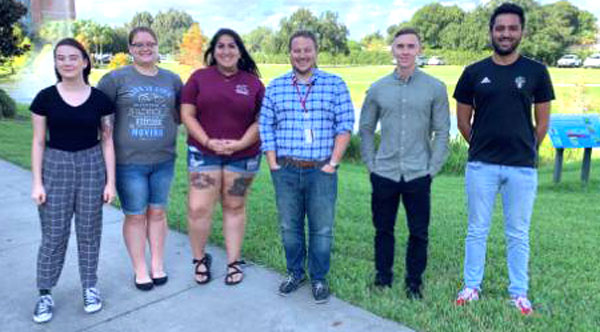Florida Tech Receives New Grant to Advance Ongoing Research for Powerful Doping Tests
By Ryan Randall, Florida Tech News Bureau // February 18, 2022
expands work for computational modeling, machine learning

BREVARD COUNTY • MELBOURNE, FLORIDA – Even as a high-profile doping incident rattles the 2022 Winter Olympics, scientists at Florida Tech have received new funding to advance ongoing research that could result in better detection of performance-enhancing drugs and help to protect the playing field in future Olympics and other competitions.
Following an initial grant in 2019, chemistry assistant professor Christopher Chouinard received additional funding through the Partnership for Clean Competition, the anti-doping research collaborative that oversees all anti-doping research in the United States.
The new funding expands the work to include not only experimental analytical chemistry but also computational modeling and machine learning with chemistry assistant professor Roberto Peverati.
Chouinard is working on research to better detect previously unidentified performance-enhancing drugs that are not yet found on the World Anti-Doping Agency’s prohibited list.
Chouinard’s methods are built on a new approach. He and Florida Tech alumnus and research assistant Sam Maddox utilize ozone to create a chemical reaction with the sample, allowing them to analyze it for PEDs in a much more efficient and accurate way than current testing.
This process, previously used in a different type of research involving lipids, allows testers to detect steroids that are difficult to differentiate from naturally produced testosterone.
Last month, Chouinard published a paper that is a major stepping stone toward the routine use of mass spectrometry for analyzing anti-doping samples.
Mass spectrometry is an analytical tool used to measure the mass-to-charge ratio of one or more molecules in a sample.
“Toward Routine Analysis of Anabolic-Androgenic Steroids in Urine Using Ion Mobility-Mass Spectrometry” was published in the Journal of the American Society for Mass Spectrometry.
Using mass spectrometry to detect anabolic steroids in human urine, Chouinard and his research team previously were able to meet the performance metrics that the International Olympic Committee-founded World Anti-Doping Agency (WADA) wants in a method.
Part of the new funding is also to demonstrate that the testing method is ready for “prime time,” Chouinard said.
“We’re somewhere very, very close to the doorstep of when will this technology actually be used in, for example, Olympic drug testing,” Chouinard said. “We sit here in 2022, and optimistically, this is something that could actually be tried out, at least in a pilot capacity, maybe in the ’24 games.”

Chouinard and his team have been able to show through their methods they can analyze the sample to a single compound and detect the testosterone in the sample.
Now the team will have to do that for over 60 anabolic steroids, confirm that they can test all of them at the required level and potentially even mixtures of several.
Rather than attempting to detect the doping substance or method itself, the researchers will also account for normal levels using the athlete’s biological passport, which monitors selected biological variables over time and can indirectly reveal the effects of doping.
They will also factor in when the sample is taken, the subject’s diet, and age, as those can affect levels in the sample.
“An athlete will test several times and they’ll measure their testosterone levels, and they’ll have a very good idea for what a baseline level is,” Chouinard said.
“And then they can look out not so much for the absolute value, but changes. If suddenly there’s a spike in the concentration of a particular endogenous compound, that might be indicative of doping. So, we have to account for that with our methods.”
The second part of the new research expands into computational methods. Working together, Peverati, a computational chemist who works with modeling methods, and Chouinard can build various molecules and predict what they might look like if identified using their experimental methods. This is crucial as testers are constantly playing catch-up with performance-enhancing drugs.
“If somebody develops a new drug and athletes start using it, there’s a lag time between where they start using it and potentially getting performance-enhancing benefits,” Chouinard said.
“And when we can officially say, ‘Okay, we’ve developed a method to identify it, we’ve confirmed that it does confer enhancements to performance,’ then we can officially ban it and put it on some list such as the WADA prohibited list.”
The computational side is another key piece of anti-doping research.
When building the computational predictive library of molecules, Chouinard spoke with collaborators at Palm Beach Atlantic’s School of Pharmacy to see not only what compounds could possibly show up via the prediction methods, but also what compounds would have performance-enhancing effects.
This interdisciplinary approach will be key to future testing success, Chouinard believes.
“I think if or when this takes us to the next level, it’s going to be a real group effort of people from several different fields coming together with a common goal of saying, ‘Can we take anti-doping testing to a level that’s really never been envisioned before?’ – which is predictive and proactive rather than reactive,” he said.
CLICK HERE FOR BREVARD COUNTY NEWS














